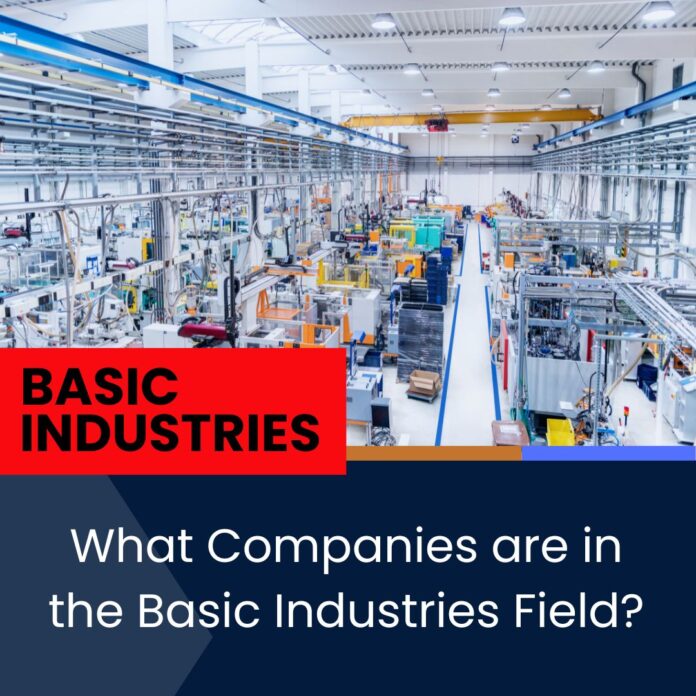The phrase “basic industries” could seem familiar if you’re in the market for a new job, mulling over potential college majors, or researching potential stocks to add to your investing profile.
The NAICS North American Industry Classification System lists about 6 million “basic industries” enterprises in the United States as of 2019. These businesses hire over 136 million people, according to the U.S. Bureau of Labor Statistics. The sector is home to around 300 equity funds, value stocks, and exchange-traded investments, all of which focus on businesses in this industry. There are many other small businesses too that help are easy to start when you you get services by stunners .As they write a good plan how to start a business.
However, what kinds of businesses make up the basic industries sector? Let’s discuss!
What Is A Basic Industry?
Basic industries are economic sectors that produce either raw materials or semi-finished goods that are then used by other sectors to manufacture consumer goods. Agriculture, minerals, and industry are all good examples.
Because they generate revenue and provide goods and services that are then redistributed and used in other sectors, basic industries are the engine of any economy.
Furthermore, the basic industries provide a large number of jobs and contribute significantly to the growth of any economy.
Types Of Basic Industries Companies
The four main types of basic industries include:
Primary industries are those that collect raw materials from the soil, such as plants and minerals. Agriculture and mining are examples of primary industries.
Secondary industries are those that require raw materials as inputs to produce other goods. Power plants, for example, are secondary industries because they require coal to generate electricity. This category also includes manufacturing plants and chemical refineries.
Tertiary industries, such as textile mills and printing presses, rely on both primary and secondary resources to create their final products.
Auto parts factories, for example, are examples of tertiary industries because they use refined products from primary and secondary industries in their manufacturing processes.
What Companies Are In The Basic Industries Field?
Here are 9 best examples of the companies in the basic industries.
1. Cargill Incorporated
Cargill Incorporated, founded in 1865 by William Wallace Cargill, has grown to become an American and global ford enterprise. It is the largest privately held company in the United States. The mission of the company is to become the best at feeding the world by distributing goods and ideas all over the world. The parent company owns a number of Cargill companies, including Cargill Meat Solutions, Provision AS, Cargill Ltd, and others. Cargill Inc (CARG.UL), an international commodities trading firm, reported $165 billion in sales for fiscal year 2022.
2. International Paper
The headquarters of the American pulp and paper conglomerate International Paper in Memphis, Tennessee. Since its inception in 1898, the company has grown to employ over 49,000 people worldwide. It has added over 25,000 new clients from 150 different countries in the last year. Simply put, International Paper is the world’s largest paper manufacturer.
The business is divided into three divisions:
- Industrial packaging
- Printing papers
- Consumer packaging.
The company’s offerings include a wide variety of paper goods, from corrugated boxes to envelopes to commercial printing sheets to plain old office copy paper. International Paper runs a number of well-known brands, including Hammermill, Springhill, etc.
3. Chevron Corporation
Chevron Corporation is a multinational energy corporation headquartered in San Ramon, California, USA. Since its inception in 1906, the company’s global workforce has grown to over 42,000 people. In more than 180 countries, it explores for oil and gas, produces and refines petroleum products, markets those products, and manufactures chemicals for use in a variety of applications.
Simply put, Chevron is a global energy powerhouse and one of the world’s largest corporations. The company primarily operates in the Americas, Africa, Europe, the Middle East, and South America. Chevron is also a major player in the natural gas industry in the United States.
4. Newmont Mining Corporation
When William Boyce Thompson founded Newmont Mining Corporation in 1921, it quickly became the world’s largest gold mining company. It employs over 14,000 people in offices around the world, with headquarters in Greenwood Village, Colorado, USA. The company’s top priority is to establish a safe and dependable mining operation. They are now mining for gold, copper, and other resources in several countries.

Newmont Mining Corporation is a multinational mining corporation with active operations in countries such as Ghana, Mexico, Australia, and Peru. The company’s headquarters are in Denver, Colorado, and Tom Palmer serves as CEO.
5. Arkema Inc.
Arkema, a chemical company based in France, manufactures polymers, industrial chemicals, and other products. It is one of the world’s largest chemical companies.
Eugène Schueller laid the groundwork in 1872 for what would later become Arkema, Inc., which would not become a publicly traded company until 1969. The organisation, headquartered in La Courneuve, France, employs approximately 10,000 people from all over the world.
Arkema’s main product lines include polymer chemicals, industrial chemicals, multifunctional compounds for coatings, electronics, acrylics, and epoxy, personal care products, medications, building supplies, and alternative energy.
In 1998, Arkema began its self-sufficient, environmentally friendly development programme. The programme is based on three central tenets:
• Promoting Long-Term Success in Business
• Effective and Efficient Management of Resources
• Social and ecological sustainability.
The company is now recognised internationally after achieving ISO 14001 accreditation for its Environmental Management System.
6. BASF
BASF, which was founded in 1865, has grown to become one of the world’s largest chemical corporations. The company employs approximately 110,000 people worldwide and has annual sales of €65 billion.
BASF was founded in 1865 by Friedrich Engelhorn, a native of Ludwigshafen, Germany, whose father was a pharmacist. BASF is a chemical manufacturer that specialises in agrochemicals, resins, coatings, and other specialised chemicals used in the production of everyday household items such as paints, food additives, and detergents. Furthermore, the company manufactures goods for the industrial sector, such as dyes and pigments.
The corporation’s headquarters are in Ludwigshafen am Rhein, which is located in Germany. Antarctica is the only continent where BASF does not have a factory.
7. Honeywell International Inc.
Honeywell International, Inc. is a global innovator in aircraft, construction technology, and industrial goods. Their main office is in Morristown, New Jersey. W. L. Gore and Associates founded the Gore-Tex Company, later renamed Honeywell International, in 1968. Its main focus was on producing Gore-Tex fabric, which is used in weatherproof clothing.
8. General Electric Company
General Electric is a multinational conglomerate headquartered in Fairfield, Connecticut, USA.
In 1892, Thomas Edison and Henry Ford founded General Electric. They were the original founders of the company. According to Fortune’s annual ranking, it is the 45th largest American corporation in total.
The General Electric Business (GE) is a major corporation headquartered in Fairfield, Connecticut. The company is divided into three divisions: Power & Water, Renewable Energy, and GE Aviation Systems & Services.
9. Berkshire Hathaway Inc.
In 1839, Oliver Chace founded the American multinational corporation Berkshire Hathaway. Among their primary lines of work are electricity production and distribution, retail sales, insurance, and similar businesses. Berkshire Hathaway, GEI CO, and other subsidiaries are now operating under the company’s umbrella. Omaha, Nebraska is the location of their corporate headquarters.
Best Paying Jobs In Basic Industries
| Jobs | Annual Income |
| Safety And Health Officer | $108,000-110,000 |
| Forensic Scientist | $64,000-74,000 |
| Horticulturist | $30,000-74,000 |
| Steel Fabricator | $29,000-56,000 |
| Synthetic Chemist | $80,000-120,000 |
| Mining And Geological Engineer | $48,000-98,000 |
| Drilling Engineer | $132,000-140,000 |
| Metallurgist | $97,000-200,000 |
| Pipefitter | $29,000-35,000 |
| Petroleum Engineer | $137,000-190,000 |
Conclusion
When it comes to the question of What companies are in the basic industries field, there is no one-size-fits-all answer. Many different types of businesses can be classified as basic industries companies, from those that deal with raw materials to those that manufacture simple chemicals. However, not every business can be evaluated this way. Ultimately, the best way to determine if a company is in the basic industries field is to research the specific company in question.
Frequently Asked Questions
Are All Businesses That Work With Raw Materials A Basic Industries Company?
Every business in the basic industries uses raw materials in some way, but not every business that uses raw materials is a basic industries business.
A mining corporation that produces raw minerals would be considered a fundamental industry. A jewellery manufacturer may begin with mined metal in its raw form, but it goes through extensive processing before being sold to the general public. As a result, the jewellery store would be classified as a non-essential business retailer.
Another example would be the production of various chemicals. A basic industries business would be one that manufactures simple chemicals that do not require advanced machinery or labor-intensive procedures.
Businesses that create and refine primary chemicals for use in other industries, on the other hand, would not be classified as basic industries. These include industrial fertilisers and paint additives that are intricately manufactured.
Is Basic Industries A Good Career Path?
Certain people are not suited to work in the basic sectors. The work itself is secondary to the benefits and perks that come with it. Working in the mining, logging, or fishing industries is physically and mentally demanding.
Furthermore, some people may find it difficult to put in extra shifts. While some people are not suited to this line of work, others thrive in it.
How Many Jobs Are Available In Basic Industries?
Depending on the state of the economy, there may be more or fewer openings in the basic industries. In terms of employment opportunities, there is some variation across fundamental sectors.In June 2022, the manufacturing sector added 29,000 jobs, according to the Labor Department, bringing it back to its pre-pandemic level.
How To Get A Job In The Basic Industries Field?
1. Determine which aspect of the industrial base most interests you.
There are numerous companies in the basic industries, so it’s important to look around until you find one that appeals to your preferences or makes use of your specific set of skills.
2. Obtain the Required Education and Training
Once you’ve decided on a specific occupation within the industry, look into the training requirements for that position. Learning can take place either online or in a classroom setting. While a high school diploma may be sufficient for some positions, a bachelor’s degree in business or finance, as well as strong managerial abilities, are frequently required for higher-paying positions in the fundamental sectors.
3. Work with other professionals in your field to collaborate.
Participating in industry-specific events, conferences, or activities may allow you to meet and maintain contact with influential individuals who can help you advance in your chosen field. LinkedIn and GitHub are two other social networking sites where you can connect with people who share your interests.
4. Pay Close Attention To Job Postings And Tailor Your Resume
Your CV will play an important role in determining whether or not you are invited for an interview. Edit your application so that it responds to each posting specifically by including the language used there. Do some research on the company to see if they are looking for someone with your specific set of skills, and don’t send the same CV to multiple employers.
5. Recognize Your Responsibilities in Your Potential Position
Being self-assured is a trait that will serve you well if you want to work in the basic industries. Before attending an interview, thoroughly research the company and the industry, and be prepared to answer questions about the position you seek. This will demonstrate to the employer that you are ready to begin work immediately.
Does It Take Long To Get A Basic Industries Career?
Basic industry careers have no set timetable due to the wide range of potential positions. The time it takes to find work varies greatly depending on factors such as one’s preferred field of work and how quickly one can learn new skills. While an undergraduate degree may suffice for entry-level positions, a graduate degree in a specialised field may be required for advancement.
To get started in their chosen field, oil geologists, for example, must have a bachelor’s degree at the very least. Furthermore, in some states, geoscientists may be required to obtain a licence before providing their services to the general public. It will take a long time to complete all of the required training and obtain all of the necessary certifications.
Certain roles in businesses necessitate hands-on experience that cannot be taught in a classroom. The in-depth knowledge required for this role can only be obtained through work experience at the organisation.
What Are the Easiest Jobs to Get in the Basic Industries Field?
Because there are many entry-level positions available, basic industries are an excellent place to begin a career. These positions are common in a variety of industries, including construction and manufacturing, as well as the service sector.
How Long Does It Take To Get a Job in the Basic Industries Field?
The hiring cycle in the basic industries is relatively short, with positions frequently filled in two to four months. While this is generally correct, specifics may vary depending on the position sought and the location.
Do Basic Industry Positions Require Engineering Experience?
Although engineering expertise is generally required for entry-level positions in the basic sectors, it is not necessarily necessary for middle management or specialist positions. You may improve your employability by learning new skills on the job, but certain qualifications are prerequisites for every employee, for example:
A four-year degree in engineering for entry-level positions
Proven experience in the relevant field
Management experience in management positions
Exceptional analytical and problem-solving skills
In order to get promoted to a higher position, you will need to have the required experience and skillset. With the right qualifications and experience, you can apply for a variety of positions in the basic industries.







